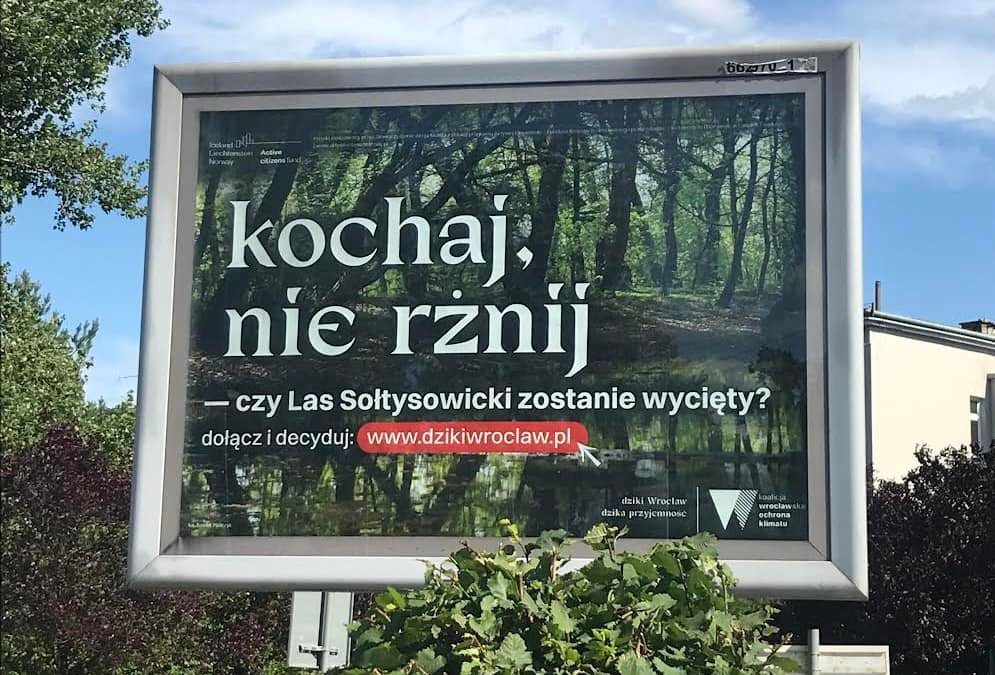A billboard campaign to promote the protection of natural areas in a Polish city has drawn criticism for using slogans based on euphemisms for sex.
The organisers of the initiative, the Wrocław Climate Protection Coalition, point out that Wrocław is the only large city in Poland without a nature reserve. They call for “high nature value areas” to be placed under special protection and have submitted 26 such applications to the mayor.
To support the cause, the coalition has placed a number of billboards around the city in a campaign titled “Wild Wrocław – Wild Pleasure”, with slogans based on double entendres that refer both to nature and sex.
“We want to get wet,” says one, warning of the risk of drought. “Love, don’t saw,” says another alongside an image of trees, with the word for “saw” (rżnij) also being a vulgar term for having sex. A photograph of a bee is accompanied by the slogan “We want to buzz in peace”, with the word for “buzz” (bzykać) also referring to sex.
Czy w Polsce nawet kampania ochrony rezerwatów przyrody musi opierać się na „szczuciu cycem”?!
Czy tylko takim przekazem dojdziemy do wrażliwości typowego Kowalskiego?
Foto: Koalicja Wrocławska Ochrony Klimatu pic.twitter.com/NUjABy46Ec
— Wojtek Kardys 🇺🇦🇵🇱🇪🇺 (@WojtekKardys) August 2, 2022
The choice of language in the campaign was met with criticism from some internet users, who called the sexual references “cringe-worthy”, “crude” and “embarrassing”.
“Does even a campaign to protect nature reserves in Poland have to be based on titillation?! Are we only going to reach the sensibilities of the average Joe with such a message?” tweeted PR consultant Wojtek Kardyś.
“Nature is not a passive background for human activities,” said Weronika Mazurek, the coordinator of the campaign. “How we treat it today and tomorrow will affect the living conditions and comfort of the citizens of Wrocław for the next long and hectic years in the city. That is why we must act quickly while there is still something to protect.”
According to a study carried out using satellite images by the Urban Policy Observatory of the Institute for Urban and Regional Development, Wrocław was one of Poland’s cities with the smallest proportion of green areas (40.9%), although it was ahead of Opole (25.2%), Kalisz (28.1%), Białystok (35.1%), Lublin (36%) and Gdańsk (40.1%).
The greenest cities in Poland are Koszalin (70%), Zielona Góra (67.5%) and Kielce (66.8%). And the most consistent structure of green areas was found in Gdynia and Kalisz.
Kraków has been named the world's fifth greenest city in an international ranking
Some local activists expressed scepticism at the index, which is based on analysis of satellite images. They argue that much of Kraków's green space is actually inaccessible https://t.co/C52snfvV6t
— Notes from Poland 🇵🇱 (@notesfrompoland) February 26, 2021
Main photo credit: Koalicja Wrocławska Ochrona Klimatu / Facebook

Alicja Ptak is deputy editor-in-chief of Notes from Poland and a multimedia journalist. She has written for Clean Energy Wire and The Times, and she hosts her own podcast, The Warsaw Wire, on Poland’s economy and energy sector. She previously worked for Reuters.




















